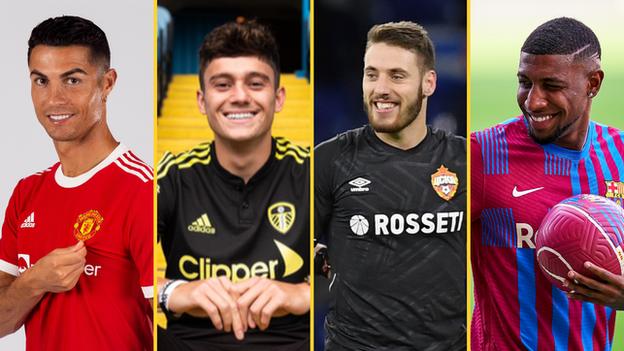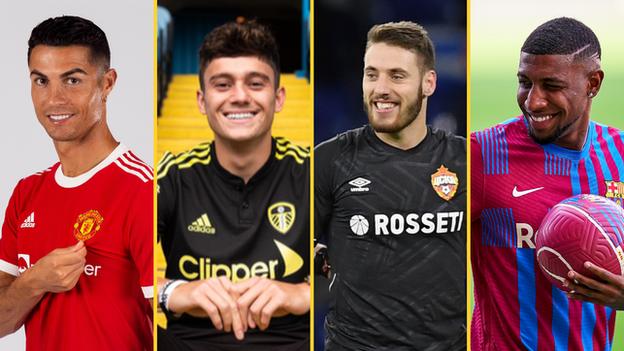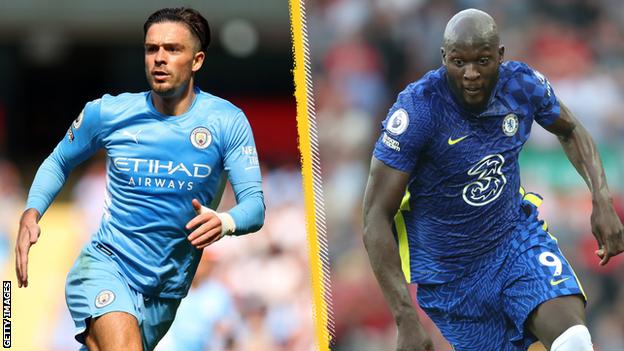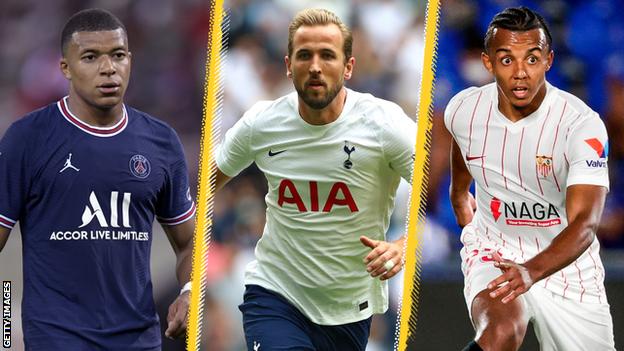Transfer deadline day: Premier League spending tops £1bn but is down on previous year
Cristiano Ronaldo’s move back to Manchester United on transfer deadline day helps to push Premier League clubs’ spending past £1bn -…


Cristiano Ronaldo completed his shock move back to Manchester United on transfer deadline day to help push Premier League clubs’ outlay past £1bn – but overall spending has dropped for the second year in a row.
The Portugal forward’s eye-catching Old Trafford return was one of the early moves to be rubber-stamped on Tuesday, before England’s summer window closed at 23:00 BST.
The biggest deal was Nikola Vlasic’s £26.8m move from CSKA Moscow to West Ham, while Chelsea left it late to sign Saul Niguez on loan from Atletico Madrid.
However, there would be no late move for Kylian Mbappe as Paris St-Germain rejected two bids from Real Madrid for the France World Cup-winning forward.
In total, Premier League clubs spent £1.1bn on transfers during the window, which was open from 9 June until 31 August. That outlay was 11% lower than the previous summer’s total of £1.3bn, itself was a 9% fall from 2019.
According to financial services firm Deloitte, this is the lowest collective gross spend by Premier League clubs since 2015, and the first time there has been a consecutive decline since the global financial crisis between 2008 and 2010.
Some of Deloitte’s other key findings from the window include:
- Deadline day activity totalled £150m, meaning Premier League clubs have spent in excess of £1bn for the sixth summer in a row;
- Premier League clubs signed 148 players, compared with 132 in summer 2020 and 128 in summer 2019;
- No less than 22% of all players signed by Premier League clubs this summer were acquired on free transfers, up from 20% in summer 2020;
- Only four Premier League clubs did not acquire a player on a free transfer, while there were eight in summer 2020;
- The German Bundesliga is the only European ‘big five’ league to increase its gross spending this year;
- The Premier League’s net player transfer spend of £560m dwarfed that of La Liga (£55m), Serie A (£50m) and Ligue 1 (£15m).
Dan Jones, of Deloitte’s sports business group, said: “This has been a remarkable transfer window.
“Club spending records have been broken, player moves – including the two greatest players of their generation [Lionel Messi and Cristiano Ronaldo] – have grabbed the headlines and Premier League clubs have spent in excess of £1bn for the sixth summer in a row.
“Perhaps most remarkable is that all this has been achieved with lower spending than we have seen in the previous two summers.”
What were the deadline-day signings?
Tottenham spent £25.8m on Barcelona full-back Emerson Royal, while winger Daniel James joined Leeds from Manchester United for £25m.
Brighton signed Spain defender Marc Cucurella from Getafe for around £15.4m while Senegal striker Abdallah Sima also joined the Seagulls from Slavia Prague before moving to Stoke on loan.
As well as Vlasic, West Ham also brought in midfielder Alex Kral on loan from Spartak Moscow. Leicester signed winger Ademola Lookman on a season-long loan from RB Leipzig.
Burnley signed their second full-back in the space of a few days by bringing in Wales international Connor Roberts from Swansea. Crystal Palace landed striker Odsonne Edouard from Celtic for £15m.
Arsenal wrapped up their busy summer by signing Japanese defender Takehiro Tomiyasu from Bologna while allowing Hector Bellerin to join Real Betis and Reiss Nelson to move to Feyenoord, both on loan.
Everton announced the free transfer signing of Salomon Rondon just as the window closed in England at 23:00 BST.
Film fans will appreciate Newcastle signing Mexican striker Santiago Munoz, whose name is strikingly similar to Santiago Munez, the fictional character who played for the Magpies in the 2005 movie Goal.
Major deals across Europe
Elsewhere in Europe, the major clubs were active on transfer deadline day, even though Real Madrid were unsuccessful in their attempt to sign Mbappe.
Instead, the Spanish giants signed highly-rated France midfielder Eduardo Camavinga from Rennes.
Juventus responded to losing Ronaldo to Manchester United by re-signing Italy striker Moise Kean from Everton on a two-year loan.
Barcelona, seeking to move out players in order to ease financial concerns, sold Ilaix Moriba to RB Leipzig before leaving it late to loan Antoine Griezmann back to Atletico Madrid.
With the exception of Germany’s Bundesliga, gross transfer spend is down for all of Europe’s other ‘big five’ leagues – in England, Italy, Spain and France – for the second consecutive year.
Behind the Premier League, Serie A is the next highest spending league with £475m. The Premier League clubs’ total gross transfer spend, though, is still more than double that of Serie A’s clubs.
What were the big transfers of the summer?

Arsenal, Manchester United, Manchester City and Chelsea were, in gross terms, the four biggest- spending Premier League clubs and were responsible for the four highest-value individual transfers in this window.
Manchester City completed the biggest single deal of the window, breaking the British transfer record to sign Jack Grealish from Aston Villa for £100m.
European champions Chelsea were not far behind, re-signing striker Romelu Lukaku from Inter Milan for £97.5m.
As well as Ronaldo, Manchester United spent £73m to sign Jadon Sancho from Dortmund and £34m to bring in Raphael Varane from Real Madrid.
Arsenal were also one of the big spenders this summer, splashing out around £140m on players including Ben White from Brighton (£50m), Martin Odegaard from Real Madrid (£30m) and Aaron Ramsdale from Sheffield United (£24m).
Liverpool were relatively quiet in the window, spending £36m to sign defender Ibrahima Konate from RB Leipzig. They did, however, tie up new contracts for a number of key players including captain Jordan Henderson, who signed a new four-year deal on deadline day itself.
Arguably the most eye-catching deal of the summer was a free transfer – Lionel Messi breaking down in tears as he confirmed his Barcelona departure after 21 years before heading to Paris St-Germain.
The ones that got away

The summer 2021 transfer window will also likely be remembered for the deals that did not happen.
Manchester City spent much of the summer pursuing England captain Harry Kane, only for the striker to commit his future to Spurs.
Real Madrid tried twice to sign Mbappe, but their two bids in excess of £100m were rejected by Paris St-Germain.
Chelsea were interested in another France international, defender Jules Kounde, but Sevilla would not entertain bids for less than his 80m euro release clause.
Ainsley Maitland-Niles took to social media to try to force a move away from Arsenal but ended up staying. Jesse Lingard will fight for his place at Manchester United after a permanent move to West Ham failed to materialise. And Wolves abandoned a late move for Lille midfielder Renato Sanches.
Mbappe saga shows where financial power lies
Analysis by BBC Sport’s Simon Stone
Where does the financial power now lie in European football? Perhaps that can be best summed up by a transfer deal that did not go through this summer.
Despite wrestling with well-publicised financial issues as the transfer window edged towards Tuesday’s deadline, Real Madrid were able to offer more than £100m for Mbappe.
Even though Mbappe is known to hanker after a move to the Bernabeu, and even though his contract runs out in less than 12 months’ time, meaning he could join Real for nothing next summer and sign a pre-contract agreement as early as January, his club PSG said no.
Financially, the decision makes no sense. But from a footballing perspective – for a club who have signed Messi and Sergio Ramos, among others, this summer in a determined effort to win the Champions League – it was the right move.
PSG opted not to join the discredited European Super League plan. They didn’t have to. They didn’t need the extra revenue.
The same could be argued for the six Premier League representatives. After all, despite the massive impact of the coronavirus pandemic, Manchester City still spent a British record £100m on Jack Grealish, Chelsea almost as much on Romelu Lukaku, and Manchester United more than that as they brought in Cristiano Ronaldo, Jadon Sancho and Raphael Varane. Tottenham were able to turn down City’s attempt to sign Harry Kane and Arsenal were the biggest spenders of all, on six new players.
There may be some sniggering at the moment about Arsenal’s plight, bottom of the table, with no points and no goals after three matches of the new Premier League season, but that situation will not last.
And if this summer is anything to go by, the reality is that for all the public discontent about the European Super League – and Project Big Picture before that – the only difference from the present landscape is that there are currently fewer clubs able to compete on that scale than the 15 who would have been granted entry to the Super League.

- Our coverage of your Premier League club is bigger and better than ever before – here’s everything you need to know to make sure you never miss a moment






